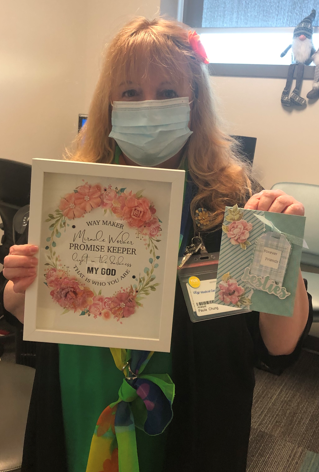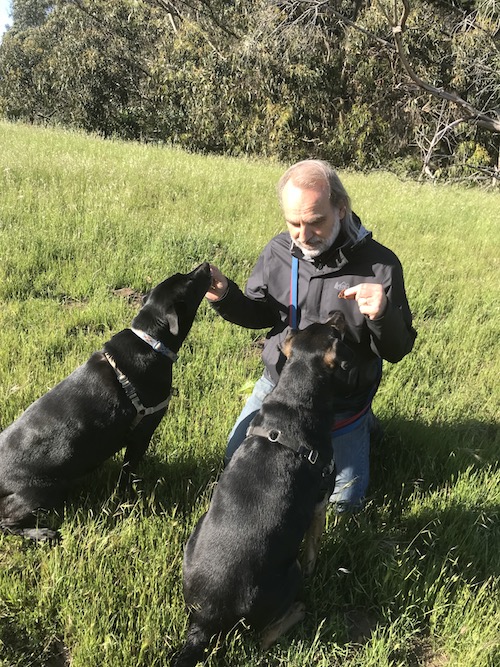With the pandemic changing nearly everything about the way people are working and living, we checked in with Cancer Center staff and faculty on how they're adjusting.
Our friends and colleagues are coping in a variety of ways. From easing patients' anxiety and motivating lab teams–to homeschooling children and trying to exercise–there's a lot of change afoot and much of it is inspiring.
Click the buttons below to read more.
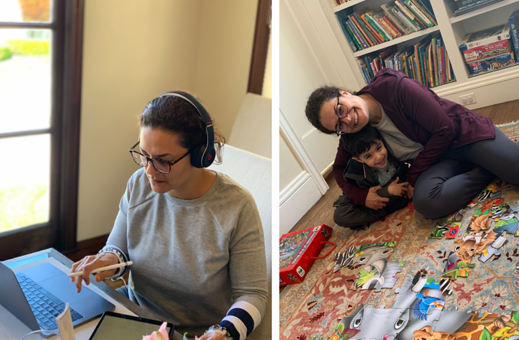
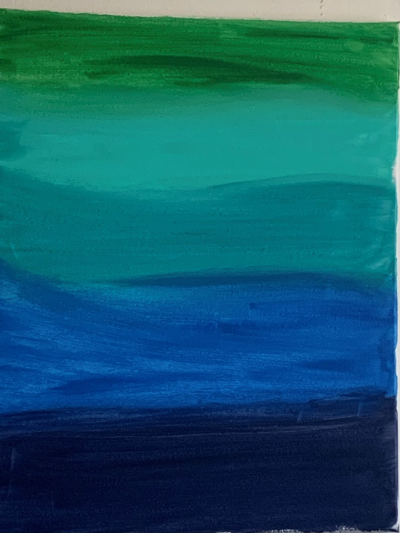
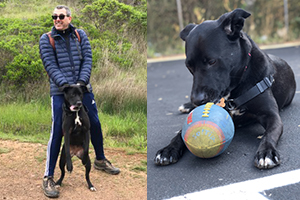
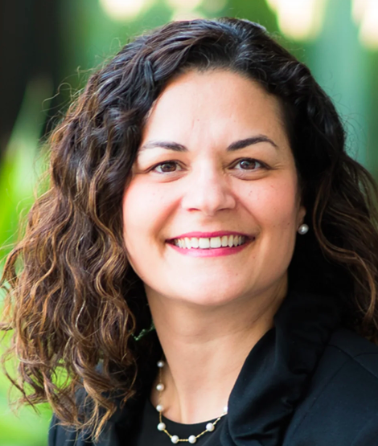 Pelin Cinar, MD, MS | Medical Director of Quality and Safety
Pelin Cinar, MD, MS | Medical Director of Quality and Safety
Most important, how are you and your loved ones?
We are thankfully doing well regarding our health. I have a 3.5-year-old son, Ari, who has been home and is doing exceptionally well under the circumstances. He misses the daycare structure and his teachers/friends but loves the fact that my husband, Rinku, and I are with him all day.
My husband is a pediatric dentist and had to close his office during the pandemic. So, there is a sense of uncertainty regarding the financial implications for our family but also the worry for his 22 employees. Both Rinku and I feel an immense sense of responsibility for everyone in our lives: our family, our patients, our team members, our friends. With this responsibility, we also feel much anxiety.

What do your days look like now – at work and at home?
Along with my colleagues, we have mostly been working from home to preserve PPE to the best of our ability and also to reduce exposure to our loved ones and our patients. So, I miss seeing a lot of my colleagues and friends from work as well as my team members who are my “work family”.
The last two weeks in March were overwhelming with uncertainties. We had meetings all day long to keep-up with recommendations, develop Cancer Center specific guidelines and help open the Respiratory Screening Clinic at Mission Bay. So, I woke up at 3 am every day to make sure that my emails were answered, the clinical queries from my team were addressed and that I read whatever was available on COVID-19 (and cancer) in preparation for a day with meetings. I was fearful that we would have a gap that we were not covering during the pandemic. Now, I get up at 5am to start my day which is an indication that my anxiety level has declined substantially.
The first meeting for me is the daily huddle at 7:45 am that I lead with the physician champions and leaders in the Cancer Center to discuss concerns and the latest recommendations. The rest of the day is a big blur involving meeting after meeting. If I get an opportunity to have lunch with my son and husband, it’s a good day. My loving husband has been great as he has been doing the heavy lifting with taking care of our son and our household. When my son sees me with headphones (indicating that I’m in a meeting), he will sneak a kiss and a hug without any other expectation – so much to expect from a toddler. But, those few precious moments are what warm my heart.
You published a paper last week in JCCN about patient and provider safety during the time of Covid-19 . How did you manage to do this so quickly? What did it entail? Is there an emerging body of scholarship on this?
I truly couldn’t have done this without my husband’s support. I spent a few nights outlining the article and finding references while my husband took over bath and bedtime routines. The most challenging part of this paper was finding data on Chinese, Italian and Spanish public health websites which are mostly not in English. I spent all of that weekend writing the draft and a few nights incorporating my co-authors’ comments. We were able to turn the paper around in one week’s time.
To answer the latter question – yes, there is now emerging publications on COVID-19 and how it is affecting our patients with cancer and our healthcare system. However, the data is limited and does not give us a full understanding of the magnitude of the problem. For this reason, COVID-19 registries are now being built for patients with cancer so that we can better understand how this pandemic may affect multiple aspects of cancer care delivery and our patients’ outcomes. We actually will have a registry that is being developed here at UCSF under Dr. Eric Small’s leadership.
Are you seeing patients these days, either through telehealth or in person? How do patients seem to be managing emotionally?
Yes, I see my patients via video visits. There is an incredible sense of fear, anxiety, uncertainty and sadness that our patients are experiencing. They already had so many of these feelings due to their cancer diagnoses, and now with the fear of COVID-19 these feelings have multiplied.
They are comforted by the fact that we can continue to see them in the safety of their home. They appreciate hearing about our interventions across the Cancer Center to protect them. What we have been trying to avoid is transforming the social distancing into social isolation as this will likely contribute to the distress they are experiencing.
How are clinical teams managing emotionally?
Similar to our patients, clinical teams have also been overwhelmed with emotions. Early on, there was so much information that was coming out and it was difficult to digest everything and make sense of what our next steps would be.
I think during these challenging times, one of the most effective interventions is clear communication and transparency – that is what we tried to do with our clinical teams. Our teams have worked so hard and diligently in rescheduling patients, transforming in-person visits to video visits, comforting our patients, adjusting to working from home while missing their colleagues and “work family.”
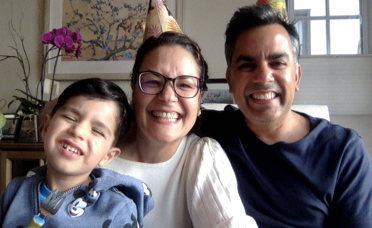
Birthday celebration with family over Zoom.
What are you doing to relieve stress?
The first two weeks, I was guilty of not taking care of myself at all. The only stress relief was the 1-2 hours I spent with my husband and my son building puzzles. With more stability in our progress with COVID-19, things are a bit better now. I am trying to cook more and have been watching the Great British Baking Show. I even tried baking over the weekend (and failed miserably).
What is your favorite TV show to binge? Books to read? Music? Comfort food?
My favorite TV show to binge is crime shows (my husband makes fun of me because I also get overly fearful after watching them). I have not enjoyed a good novel in a while, but I find it relaxing to read story books to my toddler. I love music and actually sing as a stress relief as well (lately it’s mostly Disney songs). My comfort food is charcuterie and cheese platter – not good for my cholesterol but great for my soul J.
Please submit an image that for you represents your day to day Covid experience. It can be anything you’d like (selfie, family, food, pets, indoor workout gear, artwork you’ve created, etc.) Have fun with this!
I included three pics: one of me celebrating my birthday with my family over Zoom due to COVID (I’m in the red box); another picture that my husband captured while I was working, and building puzzles with my Ari.
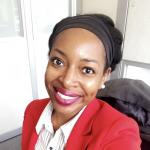
Brittany Campbell, MPH | Research Data Analyst SFCAN Prostate Cancer Task Force
Most important, how are you and your household?
We are doing okay. We are very grateful. We have healthy and filling food, a safe place to rest, and more time to meditate and reflect on how we can grow and evolve to be better humans.
What do your days look like now – at work and at home?
This schedule represents my attempt to create structure and consistency during a time when there is so much uncertainty. Some days, I follow this to perfection and other days I have a hard time focusing on work. I am learning to adjust my image of productivity during this time.
07:00AM Wake up and get ready for the day
07:30AM Morning Meditation
07:45AM Coffee and check work email
08:00AM Work – focus on something that requires innovation or learning something new (e.g., literature review). My brain is more likely to produce creative content in the morning.
10:00AM Break
10:15AM Work – continue morning activity, attend virtual meetings and/or move on to another task
12:00PM Lunch
01:00PM Work – administrative tasks and meetings
04:00PM Draft task list for the next day, download files needed for next day’s work, etc.
5:00PM Log off and put laptop out of sight so I don’t continue to think about work related tasks
5:15PM Human connection time (e.g., check in with a loved one) followed by practicing yoga, reading or listening to a podcast
6:30PM Dinner prep
7:15PM Dinner time
8:00PM Tech-free zone + quality time with my partner

"I painted this on Easter Sunday. I woke up with the urge to create and remembered art supplies I purchased earlier this year. Grateful for silence that creates space to listen to my soul."
What has been the most dramatic shift to your work during this time?
Where I would usually observe patient appointments in person, I am now conducting all study activities via Zoom or by phone.
Is there a friend, family member, peer, collaborator, staff member you would like to acknowledge now that has helped you in a unique way during this time?
My entire team has been supportive during this time. The current situation forced us to adapt and connect in new ways. We have had candid conversations about how the pandemic is affecting our lives. We exchange useful articles and resources. I am grateful for each of them especially Rena Pasick, Nynikka Palmer, Jennifer James, Claudia Guerra, Mika Caruncho, Selina Flores, Leslie Riddle, Galen Joseph, Jennifer James, Michelle Moseley, Kim Rhoads, and Eva Pardo.
What are you doing to relieve stress?
I check in daily with a loved one. Last week, I started a meditation guide to inform my daily practice. Additionally, I practice yoga to unwind at the end of a workday. I also choose one day out of the week when I do not watch the news or articles about COVID-19. In the words of a colleague in St. Louis, “I want to stay informed, not consumed.”
What is your favorite book to read? Music? TV show to binge?
I have binge watched All American on Netflix during this time.
Have you run out of anything at home that you need and cannot find (like toilet paper)?
No, we have everything we need (and more).
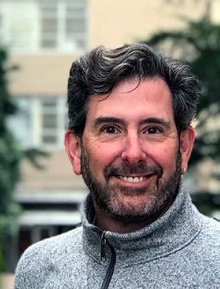
Mike Rabow, MD | Director, Symptom Mangagement Service
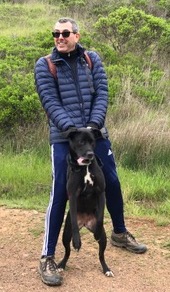 Personally, I have been shaving and showering everyday! My wife and I committed to exercising, to brushing our teeth, and to wearing “non-stretchy clothes”(that is, not sweat pants) everyday. I have been scooping up Corona-inspired poetry from across the web and sharing it with my loved ones. And I walk with my dog, Zambi, at least 10,000 steps everyday. That, more than anything, has helped me maintain my compassion and my gratitude for people!
Personally, I have been shaving and showering everyday! My wife and I committed to exercising, to brushing our teeth, and to wearing “non-stretchy clothes”(that is, not sweat pants) everyday. I have been scooping up Corona-inspired poetry from across the web and sharing it with my loved ones. And I walk with my dog, Zambi, at least 10,000 steps everyday. That, more than anything, has helped me maintain my compassion and my gratitude for people! 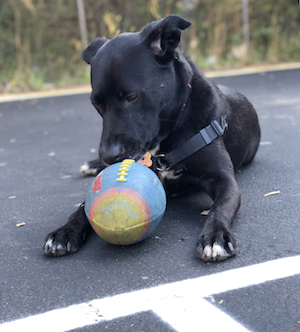 What are you doing to relieve stress?
What are you doing to relieve stress?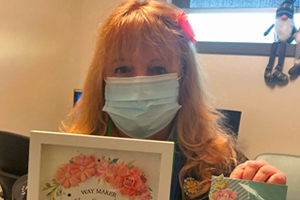
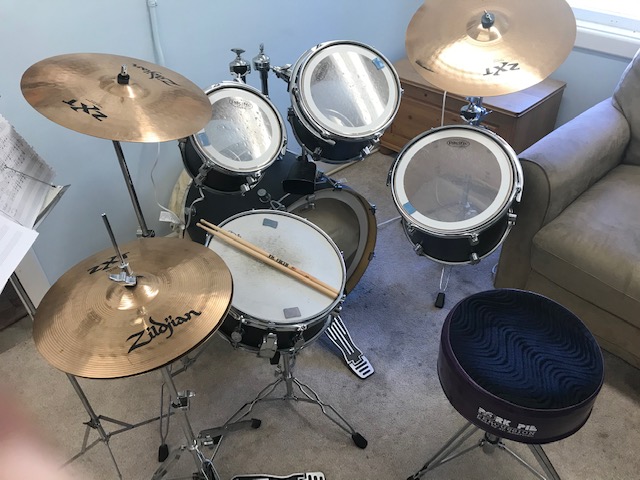
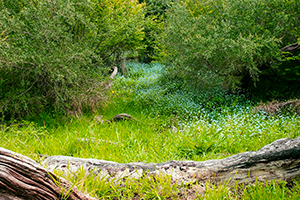
Paula Chung | Analyst
How are you and your household doing now?
We are doing really well. We have everything we need supply-wise and enjoy our extra time together.
What does your average work day look like now?
My usual shift is 7-3:50, but I’ve changed that a bit. Work from 7-12ish, take a lunch break with my husband, work again till around 2, when we take a walk around the neighborhood, then finish my work day.
How is this changing the way you think about/do your work?
I see that I’m much happier when I’m around people. Working at home is a bit boring and makes me feel lazy!!
What are you doing to relieve stress?
Reading, PBS, Facebook, daily walks, calls and texts keep me going! I try to count my blessings each day and read something spiritually uplifting.
Name a few favorite sources of entertainment (TV shows, books, music)
Piano music calms me down. I enjoy reading historical fiction and inspirational books; PBS is my new best friend!
Have you run out of anything that you need and cannot find (like toilet paper)?
Not so far, although supplies might not be my favorite brand.
Any final thoughts to share?
This crazy time has reminded me how wonderful my life really is – I have more than I need in every area. I miss my family, so calls, texts and Facebook are important to stay connected. I take time to tell folks I appreciate that they make my life better and that I love them. Walks with my husband with no distractions has been nice, we feel more bonded and connected.
When it comes down to it, if we have love in our lives, good health and hope, we have everything.
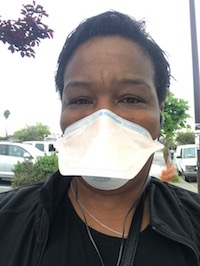 Kim Rhoads, MD, MS, MPH | Director, Office of Community Engagement
Kim Rhoads, MD, MS, MPH | Director, Office of Community Engagement
Most important, how are you and your household?
We are all holding up pretty well. It’s kind of surprising, actually. The kids seem to have adjusted easily to online school. I do have some “feels” about paying tuition for 2 hours of school per day, but I am also sensitive to the economic reality facing the school and its staff with salaries and health care benefits on the line. The dog is trying to figure out why people are home all the time, but he’s still not getting any attention; and the cats are still wishing the dog would magically disappear. My husband is still going to work, although elective surgeries are largely on hold at Children’s Hospital Oakland; so some days he works as “COVID” officer for the anesthesia department. We have developed a routine for home entry that includes a separate entrance and decontamination procedures before he comes into the main part of the house.
What do your days look like now – at work and at home?
I am working completely from home. I have an office upstairs off of our bedroom. The commute is super short and I am lucky because the office has big windows and great views of the Berkeley hills on one side and the Golden Gate Bridge and Marin headlands on the other. Like most people I am on Zoom from what feels like sun up to sun down! I am really into the virtual background, and have recently discovered that my computer is grabbing other people’s backgrounds and filing them in my collection. So I now have a gif-like tropical beach background with rolling waves and swaying palm trees (thanks Joyce Nakamura!)
As Director of Community Engagement at HDFCCC, working with community partners, this must be a really unique challenge. How are you staying connected with your partners?
It has been challenging to do community engaged work, without the physical engagement we have traditionally operated under. We had to cancel the Community Advisory Board (CAB) strategic planning meeting which was planned for mid-March. The CAB leadership decided that such a meeting needed to be held in person, in part because we just added four new agencies to the group, bringing our total to 16 CAB agencies. However, in order to maintain momentum, we shifted to virtual connection via Zoom-drop-in hour for the CAB for those who could attend.
Because our CAB is made up of agency representatives (versus individual advocates), many were scrambling on March 18, just days after the shelter in place order, to get their organizational activities transitioned to online where possible and to reassure their clients that various navigation and advocacy services would continue. We used the drop-in Zoom time to discuss new directions in light of the global pandemic and to introduce our newest staff member—Laurie Long, whose orientation finished up just hours before the campus non-essential services shuttered. We had a productive session and guided by the expressed needs of our partners, we have seized this opportunity to figure out ways to increase the connections between, within and across our community networks. We have developed a brief news alert that includes information we have gathered from our CAB members who want to share with each other; and from the grand rounds, town halls and special task forces at UCSF. We have also released a call for proposals for our CAB members and committees to develop and strengthen their communication networks, with an overarching goal of linking all of organizations in our catchment area to each other, county by county.
A few other cancer centers are going to initiate a similar program and the Community Engagement directors in those settings have agreed to collaborate. The idea is to develop a statewide community based information network that we can activate for future cancer control activities in the post-COVID19 era. I also receive (and initiate) phone calls and text messages from/to our CAB members, and other community partners as part of our OCE effort to do year-round, non-transactional community engagement. We want the HDFCCC presence to be felt even if there is no research activity or study to participate in.
Do you find yourself pivoting your expertise on health disparities from cancer to COVID?
I don’t have any experience with infectious diseases in my background or training. But in response to our CAB and community partners’ concerns and requests for information, we have shifted our efforts in dissemination to focus on COVID19. The OCE staff now attends the bulk of Grand Rounds in Medicine, Epidemiology; town halls given by various interest groups, like the Latinx Center of Excellence and the CTSI Center for Community Engagement which have focused on COVID; and we participate on some of the COVID working groups (eg. Mental health and emotional support and COVID) gathering and collating new UCSF resources and information to share with our community partners.
The CAB also requested to shift our quarterly CAB2: ChatnChew in April to hear from faculty in the UCSF Department of Epidemiology and Biostatistics (DEB), since they know that these are the faculty advising local Bay Area lawmakers. We were so fortunate to get Dr. Kirsten Bibbins-Domingo to provide an update and take questions from the CAB2: ChatnChew crew (our public mailing list) via zoom. [See Event Listing] Our emphasis is always on health equity so we look forward to hearing about the impact of COVID19 on vulnerable populations and the emerging, and disheartening, though not surprising data on how inequities drive health disparities in COVID, just as they do in cancer.
What long-term effects do you hope that this experience will have on how health inequities are acknowledged, approached?
I have always been fascinated by the history of public health and medicine. They started off as the same training, but diverged with the emergence of germ theory. Medicine became the place where instant gratification from healing occurred and public health fell by the wayside in part because the positive health effects were too diffuse to appreciate.
Once schools of public health became “independent” of medical schools, they still had to be directed by an MD. The downside was the exaltation of healthcare and medicine which spawn a false sense of security because diseases could be cured. This false sense of security means that as a society, we have become less attentive and able to successfully participate in public health interventions (look how hard is it to just stay home!). But COVID19 has ripped the veil away and now we can all see how limited healthcare is, in terms of serving the public (population) health. There are not enough resources for everyone to get what they need in the healthcare system (structural inequity); but to be fair, there never have been. This is partly why it is so easy to predict that disparities would emerge with this pandemic. These disparities are underpinned by inequity and have parallels in cancer care and outcomes. My own research emphasizes how lack of healthcare resources can drive disparities in survival. The work has repeatedly shown that the delivery of basic (evidence based) care delivered to all comers improves population level cancer survival and closes longstanding disparities gaps in some solid and hematologic malignancies.
So, in this time when our healthcare desperately needs a public health intervention to save its life, I hope people are paying attention to how much can be accomplished with low resource interventions (like basic care for cancer and public health interventions for COVID19). Ultimately, I hope that the dynamic interplay between the public health and healthcare expose for everyone, how differences in allocation of resources (inequity) will continue to drive disparities in healthcare and ultimately health and how the two should no longer function in separate silos, but rather in tandem to address both disparities and the health of the population as a whole.
Is there a friend, family member, peer, collaborator, staff member you would like to acknowledge now that has helped you in a unique way during this time?
I would like to acknowledge the two newest staff members in the OCE, Eva Pardo and Laurie Long. They have been incredible workhorses in terms of gathering information and packaging it in ways that help us communicate with our partners. They are using this slowdown in typical OCE activities to help build the infrastructure of the office. They are self-motivated and bring a depth of commitment and heart to the work of equity.
Although the pandemic creates adverse conditions for community engagement, I can already see that this time is strengthening our capacity. We will be much more agile, adaptable and versatile when we are back on campus for having worked through this time of physical separation.
 What are you doing to relieve stress?
What are you doing to relieve stress?
I have been playing drums a lot more. My kit is down in the basement, so I can play as loud as I want. After three weeks away, my drum teacher is also getting going with lessons on Zoom, so I am looking forward to learning some new stuff.
What is your favorite book to read? Music? TV show to binge?
I watch a ton of cable news, including MSNBC, CNN and Fox. Because economic, social and political factors are driving the health of the body politic (whether for good or bad), I think we need a deeper understanding of the forces that drive inequity and sustain health disparities. But in the evening, we rotate watching a few good cable shows: John Oliver, Better Call Saul, and WestWorld. Most recently, we binge watched Gentrified followed by Tiger King. Now that was a real slice of America!
Have you run out of anything at home that you need and cannot find (like toilet paper)?
No. We are pretty well stocked up. Jeff Martin (my division chief in Epidemiology and Biostatistics) talked to me about social distancing on March 3. I immediately did a CostCo shop, (yes I got TP) and then warned everyone I knew that a shelter-in-place order would come kind of suddenly. So we were prepared, which is good, because although it used to be one of my favorite activities, I hate grocery shopping in a mask.
Final thoughts to share?
Stay home, save lives!
 Aishwarya Subramanian | Clinical Research Coordinator
Aishwarya Subramanian | Clinical Research Coordinator
How are you and your household doing now?
My parents live in LA and I am currently living in SF. It has been surreal to experience the changes that have been occurring regarding travel and the stay-at-home mandate. It has resulted in changes for how our family stays in touch, and is able to reach out to each other in times of need.
What does your average work day look like now?
My average work day looks very different – my commute is now 30 seconds long! That said, it has been very strange working remotely with patients and providers to coordinate clinical trials. Most patient visits are on Zoom or through phone calls. Patients receive their drugs through shipments. And as much as possible, everyone is attempting to run clinical trials remotely.
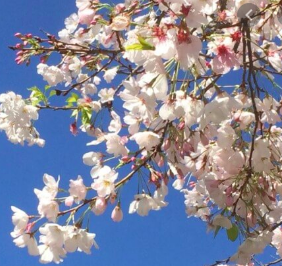 How is this changing the way you think about/do your work?
How is this changing the way you think about/do your work?
I think it is actively changing our workflows day-to-day, and it will be interesting to see if this changes how work will occur when “normalcy” returns. Will providers continue to use televisits as extensively as they were used now? Usage of Docusign, the IRB approval process, etc. has all been changing.
What are you doing to relieve stress?
I live near Golden Gate Park and the park has been a source of peace and stress-relief as I am enjoying the spring weather and the new cherry blossoms, etc. amidst these trying times for everyone. I’ve also had a lot more time to cook meals that I normally wouldn’t have had time to make – so I’ve been baking, grilling, etc.
Name a few favorite sources of entertainment (TV shows, books, music)
Some recent shows and books that I been reading and watching and can recommend – the Three Body Problem, The Great British Bake Off, What We Do in the Shadows, JoJo Rabbit.
Have you run out of anything that you need and cannot find (like toilet paper)?
Any and all paper products – kitchen towels, Lysol Wipes
Any final thoughts to share?
Stay safe and healthy, everyone!
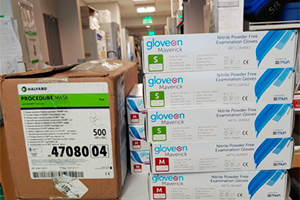
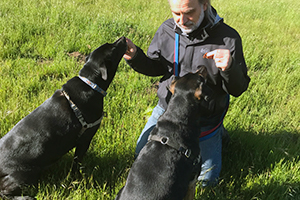
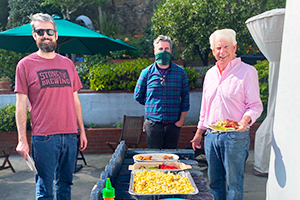
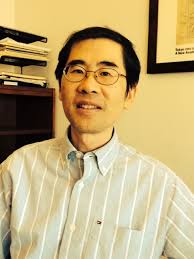 Kevin Hsien-Ming Hu, PhD | Lab Manager, Bandyopadhyay Lab
Kevin Hsien-Ming Hu, PhD | Lab Manager, Bandyopadhyay Lab
Most important, how are you and your household?
We are all healthy and in good spirits (knock on wood!), thinking the whole situation will be behind us soon.
What do your days look like now – at work and at home?
Working from home is something new for a wet lab guy like me. While I can’t perform my favorite experiments at home, nothing stops me from drafting a manuscript and catching up on recent literature. It does take some time to get used to working remotely, but I don’t miss the long hours of commute at all!
Not being able to exercise regularly is probably the most painful thing for me. I am looking forward to resuming the daily pingpong with my partners at Helen Diller when we are allowed to get back to work.
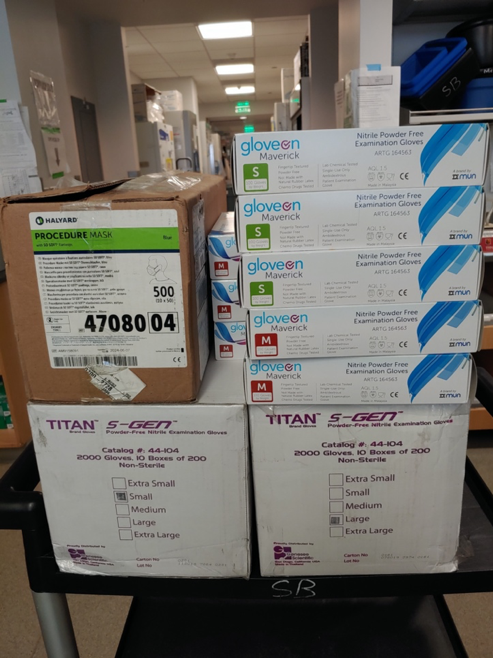
From Bandyopadhyay Lab (@SBLabUCSF) March 23, 2020
"Clearing out the lab to help #UCSFMaskDrive! @UCSFHospitals report that less than 2 weeks of PPE remain to help treat #COVID19 patients. Thanks to our fearless lab manager Kevin Hu for preparing and delivering the goods! #NIHfundswellspent
Are there elements of your research that you are able to continue, or have modified due to the current situation? (or – any details related to the closing of the lab, keeping the lab going, how you are connecting with lab staff and UCSF peers).
We had an orderly shutdown of the lab and a smooth transition to working remotely. Kudos to my PI, Dr. Bandyopadhyay and myself - the lab manager - for a careful planning and swift response. We now hold regular Zoom meetings to keep lab members connected and engaged in daily work.
Is there a friend, family member, peer, collaborator, staff member you would like to acknowledge now that has helped you in a unique way during this time?
A shout out to Amazon for the suppliers that make my tiny home office more efficient for work from home.
What are you doing to relieve stress?
For peace of mind, I turn to Animal Crossing on the Nintendo Switch. (no social distancing required, yeah!)
What is your favorite book to read? Music? TV show to binge?
I have never thought that the Netflix family plan is worth every penny, until now!
Have you run out of anything at home that you need and cannot find (like toilet paper)?
No, since grocery shopping is still allowed. I do miss the dine-in experience that can’t be reproduced by to-go and delivery service.
Final thoughts to share?
With the sense of emergency, I believe we will get through this tough situation just fine if everyone keeps the safe SOCIAL DISTANCING!
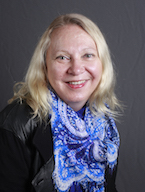 Val Weaver, PhD | Director, Center for Bioengineering and Tissue Regeneration
Val Weaver, PhD | Director, Center for Bioengineering and Tissue Regeneration
How are you and your loved ones?
We are doing well.
What do your days look like now – personally and professionally?
Professionally, intense and days are completely packed. I am busier than I was prior to Covid19 sheltering at home!
Personally, I am doing well and enjoying not having to travel for work. However, I am very busy with very little chill time!
What is going on in your lab these days? Is work able to continue at all? Are you doing any Covid-related research?
We are not doing any Covid-related research. My lab is actually quite productive. I have 18 group members, including myself. I Zoom with members daily for an hour each, so it takes about two weeks to meet with everyone individually. We also have started several journal club/think tanks on various topics with groups at UCSF and across the USA, the UK and Europe. This has kept my group occupied, intellectually engaged, and communicating.
In addition, I have been working to ensure that each person is busy with projects. Some have been learning coding; others are learning modeling and machine learning to analyze large clinical image sets. Some are busy writing grants, paper, review articles, etc. One person is writing a thesis.
I have been most impressed with how well my group has adjusted – we also have our weekly zoom meetings – and have continued presenting data – and recently invited guests to come and present. In the end the time has been well spent recalibrating, reassessing, and reorganizing.
How is your team managing? What has been the hardest adjustment for them?
They miss the bench work, and they miss their colleagues. Many any are living in efficiency apartments, and it has meant that they are quite challenged living in a small space for days on end. I have arranged time to chat with each person, and they have formed support networks.
They get outside for exercise. One person has stopped smoking and has taken up running and yoga. They support each other, and we have expanded our network to other members outside of our group so that no one feels isolated.
The hardest thing for them is the isolation, especially the younger ones. But thus far, no one is depressed. As long as they are making progress on their projects, learning and actively engaged, they are doing well. They are staying quite positive.
I have strongly urged them not to sleep late, and to keep mentally healthy. They need a routine, to eat healthy meals, exercise, and stay connected to family and friends. They’re even exchanging recipes. A few were watching too much TV and news like CNN and MSNBC. And were getting quite upset and almost paralyzed with anxiety. Talk sessions and keeping them engaged intellectually has helped.
However, I do worry about keeping them this occupied it this continues for more than a few more weeks. Perhaps, they can continue with this intensity of engagement for another month, but beyond that, I do worry.
What are you doing to relieve stress? Is it helping?
A strict routine: up early, emails, coffee. We have two dogs, so we go for a 45-minute hike each morning. I have heaps of zoom calls and meetings. I’m working on two grants and several manuscripts, editorial work etc. I break for lunch for 30 minutes and then back to work. At the end of the day, the dogs get another hike.
I have been cooking healthy food, which is motivating. No junk food. And I’ve been doing a bit of gardening. I also limit TV, spend quality time with my husband, and stay in touch with family and friends. Plus, I am probably doing obsessive house cleaning!
Thus far, I have no time to feel anxiety. I’m actually tired most nights and have zero problem sleeping these days. Plus, no jet lag to worry about!
Have you run out of anything at home that you need and cannot find (like toilet paper)?
Nope. I anticipated this potential situation, watching Wuhan, Italy and Spain. Also, I have a young resident in my lab from near Wuhan and another postdoc from Barcelona, so I already stocked up dry goods.
Final thoughts to share?
This too will pass, and we will be stronger and better for this. It is all too true that life can turn so quickly and being flexible and humble helps. I feel very grateful to be a scientist with a job that keeps me intellectually and emotionally engaged, and that I have a fantastic group I can interact with, even if only electronically. I also feel grateful to have a warm loving relationship with my husband, a nice, comfy house to live in, and not be worried about my job or money. Too many others are not so lucky, so I have no right to feel anxious or worried.
My biggest angst, frankly, is that I feel that I should be making more of an effort to help others
I have purchased groceries for older friends, so they don’t have to leave their homes. I am donating to food banks. When this whole sheltering-at-home ends, I plan to volunteer at a food bank. It’s the least I can do.
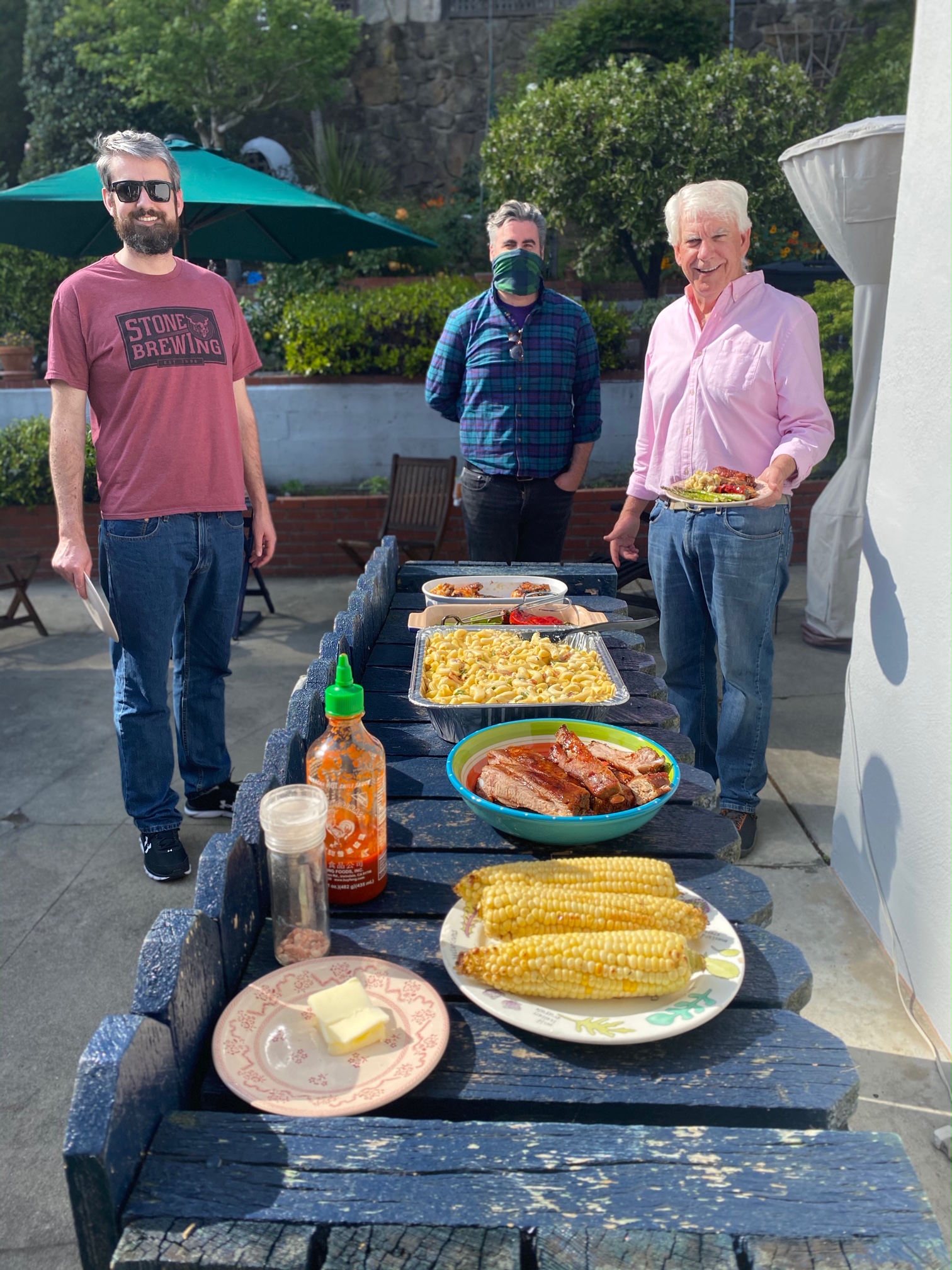 Will Toomey | Lab Operations Manager
Will Toomey | Lab Operations Manager
Most important, how are you and your household?
Doing well considering, grateful to have my health during this difficult time.
What do your days look like now – at work and at home?
I’ve replaced my commute coffee with coffee on the porch. Working remotely most days with trips to the office when essential. A lot of my work is done through email now and various other MyAccess Apps. After work, I’m able to explore the neighborhood and am working on my Spanish.
What has been the most dramatic shift to your work during this time?
With guidance changing daily in early March, I was solely focused on making sure the labs were prepared with continuity plans in place and had the latest information. Since the madness of that initial stage ended, I’m utilizing reclaimed time to take advantage of various online training opportunities.
Is there a friend, family member, peer, collaborator, staff member you would like to acknowledge now that has helped you in a unique way during this time?
I have to say it has been really great to see the faces of the HDFCCC Facilities Staff through our Zoom meetings. It is motivating and frankly reassuring to still be able to come together. I also have to thank all the essential workers who volunteered to help keep the deliveries coming to the Diller and Mt. Zion Cancer research buildings.
What are you doing to relieve stress?
Biking around Lake Merritt and the streets of Oakland is very uplifting especially now with cars restricted in some areas. I’ve also found cooking to be a relaxing exercise, especially while accompanied by music from my eclectic collection of vinyl.
What is your favorite book to read? Music? TV show to binge?
Currently Reading ‘In the Distance’ by Hernan Diaz, listening to Ásgeir, and streaming Living with Yourself
Have you run out of anything at home that you need and cannot find (like toilet paper)?
Everything is in stock, but I wish my vegetable garden would grow faster
Final thoughts to share?
I was lucky to be able to celebrate Easter with a visit to my parents’ backyard to share a meal with them and my brother, following social distancing and other appropriate mitigation guidelines, of course.
On a final note, I wish everyone good health, strength and patience as we work through this crisis together. When we are able to return, I hope the Staff Engagement Team will host a talent show so everyone can show off their new hobbies.
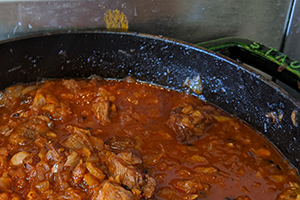
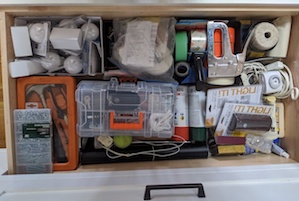

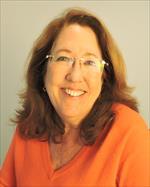 Mary Barcellos-Hoff, PhD | Vice Chair of Research, Radiation Oncology
Mary Barcellos-Hoff, PhD | Vice Chair of Research, Radiation Oncology
Most important, how are you and your household?
All good
What do your days look like now – at work and at home?
At home and at work are one and the same for me. Saving a lot of time without the commute from Berkeley.
What has been the most dramatic shift to your work during this time?
Without the need to commute, I begin work very early coffee in hand, so the best working hours for me are uninterrupted.
Is there a friend, family member, peer, collaborator, staff member you would like to acknowledge now that has helped you in a unique way during this time?
I really do miss dinner parties, but my friends have stepped up with Zoomtails.

"I put together a pictorial recipe for Grandmother’s goulash for my sons."
What are you doing to relieve stress?
Gardening and walking—there is a glimmer of silver lining in that we are having a gorgeous spring during which to shelter. I put together a pictorial recipe for Grandmother’s goulash for my sons, made a mask from a linen napkin, and cleaned out both my sock and tool drawer.
What is your favorite book to read? Music? TV show to binge?
Binging odd detective series from England, Ireland and NZ. Keeps me engaged by trying to understand their accents.
Final thoughts to share?
There is always, always, always something to be thankful for.
